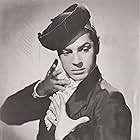As a music presenter and a Latin-music radio host of 20 years, I was compelled to correct a couple of misstatements in previous postings about the musical artists featured in this film. While "Pan-Americana" is not exactly "An American in Paris" (...or even Manhattan), viewers should be more cognizant of what they're actually seeing and hearing.
In the post titled "Just Doesn't Cut It", the writer commented: "The contrived plot is a boy-meets-girl story, interrupted by musical performances of Latin American artists, some of which were Carmen Miranda wannabees, and none of which were memorable or even particularly good." Um... amazingly inaccurate! If only for his presence alone, Miguelito Valdes is one of the LEGENDARY vocalists and band leaders of the Latin-American popular/tropical music genre. You could think of him as a combination of two notable U.S. artists: r&b legend Jackie Wilson (from a stylistic standpoint), and crooner Tony Bennett (as far as his 'stature' within the Latin pop music genre). So... to It was actually Mr. Valdes who popularized the song "Babalu" throughout Latin-America and the U.S. in the late 1930's. Likely because of Mr. Valdes obvious African blood, he was denied the opportunity to perform it in the Broadway show "Too Many Girls." The role ultimately was given to white-Cuban actor Desi Arnaz, a more 'traditionally handsome' man (to 1940's North American eyes) who parlayed the Broadway success into an MGM contract. While Desi Arnaz was himself a charismatic performer (a decent actor and visionary television producer), he had nowhere near the vocal presence of Miguelito Valdes (Arnaz himself would have laughed at the mere notion of a comparison...).
Sprinkled throughout the film are also rare appearances by folks like the legendary Brazilian composer and band leader Nestor Amaral - the musician who accompanied Carmen Miranda to the U.S. in 1940(!). Antonio and Rosario performed to great acclaim internationally, and performed in a number of Hollywood musicals. After their breakup, their careers continued with success. Antonio would eventually become the Director of the Nacional Ballet de Espana! Chuy Reyes, who led the 'house' Latin band at Hollywood's glamorous Mocambo for years.
The point is, while they may not be major "cross-over" names like Xavier Cugat, this film is an important document of some very influential Hispanic performers. To 'dismiss' them as cut-rate is simply wrong.














